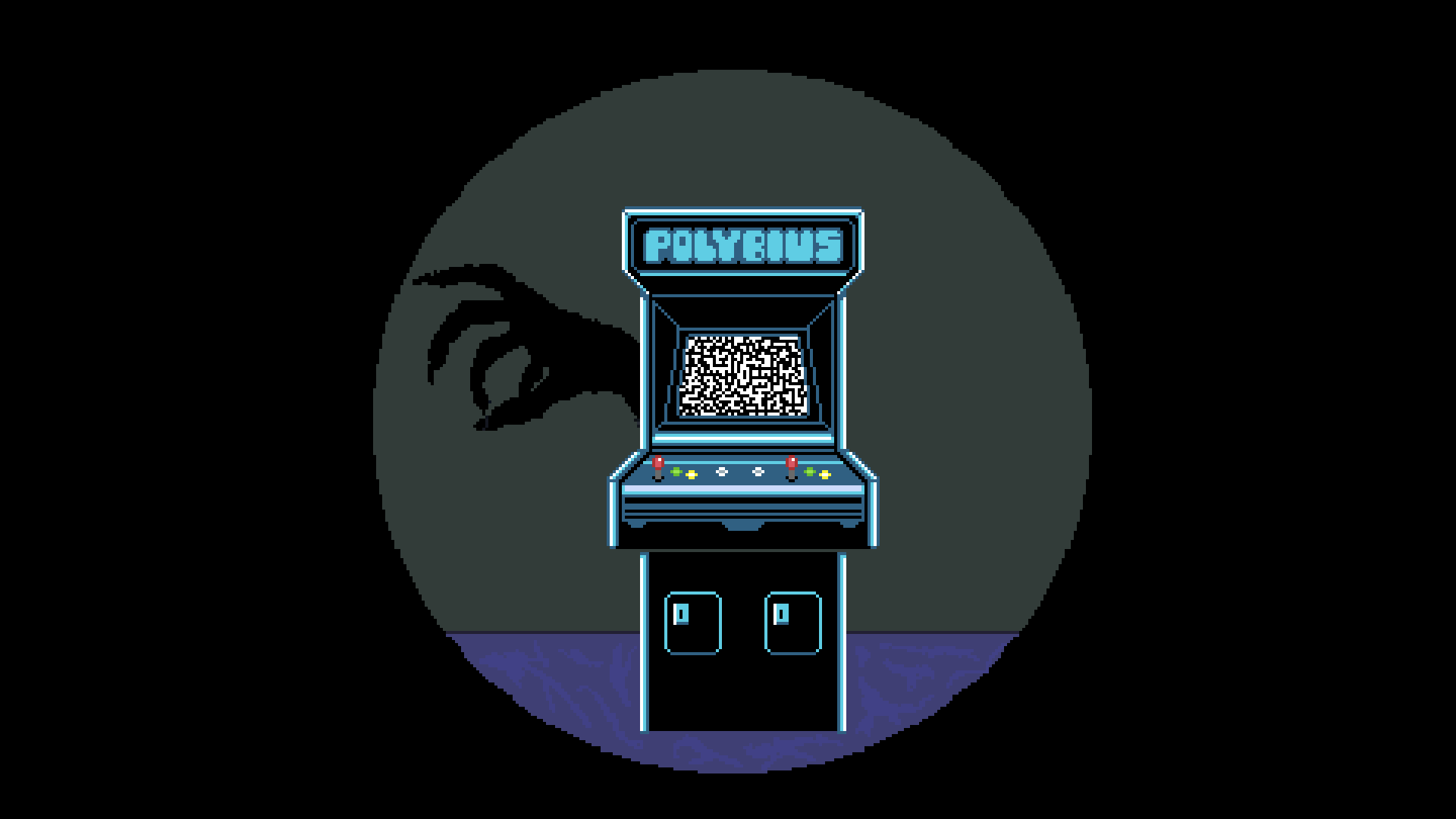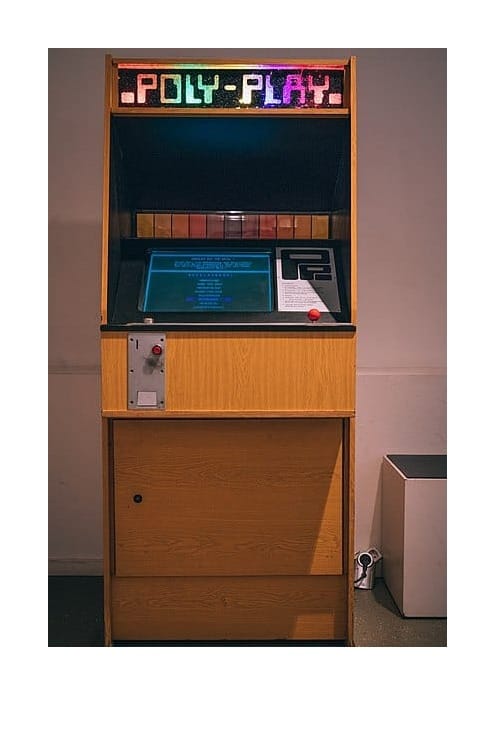Polybius: The Waking Nightmare of the Arcade
Tracking the ‘80s arcade scene and its most notorious cabinet

In 1981, the arcade scene was at its peak, and video game fever was widespread. But an arcade in Portland, Oregon became the scene of medical emergencies, violence, and bizarre behavior. Patrons were having heart attacks, seizures, memory loss, and breaking out in violent brawls. All of this seemed to originate from a single arcade cabinet called Polybius.
What did the government think of this? What will the authorities do about it?
Well, they created it.
Enter the Arcade
Papa, don't preach
I'm in trouble deep.
Madonna
The voice of Madonna fades into the distance with your mother’s Buick LeSabre, ears now tuned to the synth of Depeche Mode, New Order, and artists you’ll never find. Bubble gum and tobacco hit the nose and neon dances in your eye. Those kicks - old and faithful - glide over the gaudy, calming shades of carpet that remind you of a spaceship. The weight of the roll of quarters in your pocket, hefty and assuring. Hammer locked, cylinder loaded, eyes on the scoreboard. Gloria is there – hair piled high – and you remember that kiss by the Galaga machine. Ain’t nothin' gonna break your stride.
It’s 198X and dystopia is nowhere to be seen.
It was an optimistic time. The sky was the limit and a better tomorrow was an infectious belief. The music and films of the era reflected that, and so did the arcade. Unlike cinema, game developers were not making games of post-war paranoia or bleak dystopian futures where the real monster is ourselves. Galaga was your brother's space marine fantasy, Centipede was a "good trip", and any deep and dark analysis you heard of Pac-Man was overthinking it.
But something began to creep into the dark corners like an insidious mold reaching up the arcade bezel and over the coin line to grasp at unsuspecting hands. It stood in corners only you could see, alone and radical. It was here to flip the score.
They called it...Polybius.
Enter Polybius
All I know is that to me
You look like you're lots of fun
Open up your lovin' arms
I want some, want some.
Dead or Alive
Word spread out of the arcade of the new arrival. Polybius was developed by a company called Sinneslöschen; a name that roughly translates to "senses deleted" or "sense deleting". It dazzled with visuals unlike anything ever seen before, described by players as hypnotic. Its sound, an auditory marvel; a clear leap forward in sound chip technology. The gameplay, by all accounts, was indescribable, almost indiscernible. It was vector-based but vibrant, a far cry from games like Tempest. In its world were strange shapes, wild, psychedelic colours, and subliminal messages.
Playing it was known to cause physiological effects like amnesia, seizures, anxiety, memory loss, and sudden aggression. Others reported feeling sick, getting headaches, and that some kids had heart attacks and strokes while playing. Yet players were lining up to experience this leap in digital entertainment, ready to flirt with death just to experience the trance that Polybius would put them in. A game that took them to another world.
But this drug was watched by shaded eyes.
Men in Black were reported to be seen in the arcade. They would access the machine and alter aspects so that the game would have different effects on the player, turning it into digital Russian roulette. Some claimed that the game was recording and listening to them, collecting data for some nefarious reason. A couple of kids played it and then disappeared. Rumors began to spread that the kids had been abducted. Others claimed that the Polybius machine was a means to recruit, like in the 80's film The Last Starfighter.
Suddenly, the game disappeared just as fast as it arrived, leaving people to wonder if it ever existed at all.
The Kids Aren't Alright
I'm taking a ride with my best friend
We're flying high
We're watching the world pass us by
Never want to come down
Never want to put my feet back down on the ground
I'm taking a ride with my best friend.
Depeche Mode
In the void of Polybius, the tokens kept circulating and the kill screens continued to rage into the neon night, but a shadow lingered. If Polybius was never real, what happened to everyone and would it continue? And if it was real, what was it and would it return? Was the arcade dangerous or another target of sensationalized media?
In 1982, Jeff Dailey died of a heart attack while hitting a high score on the game Berzerk at the age of 19. Later that year, Peter Burkowski also died of a heart attack at age 18. Brian Mauro, age 12, collapsed while trying to set a record on Asteroids. Two individuals got into a fight over a game and one stabbed the other killing him.
Now, Peter Burkowski's autopsy showed heart issues that predated his day at the arcade. Brian Mauro was 28 hours into a binge of trying to break that Asteroids record, eating junk food, and drinking a ton of cola. The Jeff Dailey story has been pushed back against due to lack of evidence and it is said his high score had the number 666 in it.
It’s easy to see how these stories hitting the news would build a pyre for paranoia over video games. In a modern context, it all sounds silly, but in the 1980s, video games were the new kid on the block. Historically, new technology and storytelling mediums have always been treated with fear and disdain. Film was seen that way once upon a time, then television, and then videogames - the medium being the newest one and a high mark of both technology and storytelling.
So, just how much of this legend is true?
A surprising amount.
The Truth is Out There
Stop, living on video
Stop, integrated circuits
Stop, sur un faisceau de lumière
Stop, is this reality?
Trans X
Polybius is an urban legend. A hoax. There is no proof that this game ever existed.
The reason the Polybius story maintained such believability and has stuck around is because the individual elements that make up the myth are all true. It’s only the core cabinet that binds them together that is fiction.
Let's break it down.
Were arcades frequented by men in black?
Yes.
FBI records show that they were in fact monitoring arcades in Portland around the time of the many reported incidents and the infamous Polybius machine. And this continued for years by authorities, not just in Portland but all over the country.
Arcades were known to be places of gambling, drugs, sex, and pickpocketing. Not because of a concentration of teenagers but because of the dangerous allure and corruption of video games! This was not unfounded though. Arcades were a popular place for teens and young adults to go on dates, talk over Pacman, win prizes for their guy or gal, or meet up with friends. Activities like selling cigarettes and pot to minors, betting against each other in games, and posturing leading to brawls happen anywhere you gather enough youth. Come for the video games, stay for the rebellion.
Most importantly, many arcades were money laundering fronts for illegal gambling rings and authorities knew this. They were under frequent surveillance, and unless the undercover cop or federal agent was a secret Asteroids fan, they stood out.
During this investigation, cameras and microphones were installed in a few cabinets. One such game was the vector-based game, Tempest. Games of this style made some people feel sick and Polybius is remembered to be vector-based. When the men would come to retrieve the tapes, they would walk in, open the machine, and leave with not a care towards subtlety.

Were there arcade games used and created by the military?
Yes.
Atari's Battle Zone (released in 1981) was a popular, wireframe vector-based game where players controlled a tank. The cabinet itself was decked out like the interior of a tank, complete with a periscope-styled screen the player looked through.
The United States Military approached Atari with the idea of adapting Battlezone's code to make it more suitable as a training simulator. A cost-efficient and safer method than other means.
This was actually developed and is known as the Bradley Trainer. Battle Zone programmer, Ed Rotberg was hesitant about the project as a pacifist, only relenting because management was "under the gun," so to speak.
This made the ABC news in - you guessed it - 1981.
Did arcade games cause memory loss, hallucinations, temporary personality changes, and convulsions?
Yes.
Public knowledge and awareness of epilepsy was relatively low in the 80s. The advent of arcade games led to undiagnosed people discovering they were epileptic because, before that, their exposure to those kinds of images had been minimal. An arcade cabinet's close range, bright lights, and flashing images were the site of many people's first seizure. There are photosensitivity warnings on games to this day.
There are different types of seizures and the symptoms vary from person to person. Some lose consciousness, dropping to the ground. Some maintain consciousness but will experience changes in emotions, jerking limbs, hallucinations, and dizziness. Repetitive movements like lifting an arm or walking in a circle can manifest while being unresponsive to others. There can be facial twitches, rapid blinking, loss of vision, and short-term memory loss. Absence seizures lead to one staring into space.
Now, if you are not familiar with this condition or any of these symptoms - which most in the 80s were not - and especially if you were a kid, these behaviors would look like mind control. Government, alien, videogame mind control.
YVAN EHT NIOJ. YVAN EHT NIOJ. YVAN EHT NIOJ. YVAN EHT NIOJ. YVAN EHT NIOJ. YVAN EHT NIOJ. YVAN EHT NIOJ. YVAN EHT NIOJ. YVAN EHT NIOJ. YVAN EHT NIOJ. YVAN EHT NIOJ. YVAN EHT NIOJ.
- [REDACTED]
Did strange arcade cabinets that no one heard of appear and disappear in a manner of days?
Yes.
Eager to cash in on the arcade boom, there was a thriving market of cheap bootleg arcade cabinets. Information on these was not readily available in those days, meaning there was no quality control present. Local business owners bought these up because they were cheap and the more cabinets in your place the better, both for advertising and having more money being spent at once. Unfortunately, the games were spotty and most players would try them once before never returning. Worse, these cabinets would often break down in a week or even days. Whether it was from no one playing or the machine being busted, these titles got moved out to make room for the newer and better.
It was common for a minority of patrons to have played some bizarre-sounding game no one had heard of, only for it to not be there when they arrived to show a friend. Their word or sanity was questioned as Centipede now stood in that corner.
CONFORM
These factors are all unrelated, yet together they create the Polybius narrative. If one thinks of the kind of schoolyard rumors we all heard growing up, it begins to make sense how it all came together. An arcade with men in black poking around machines that were there one day and gone next, while kids begin to display bizarre behavior before never returning.
It's a perfect storm.
OBEY
Furthermore, the story of the machine itself begins to fall apart as one looks into it.
The name of the developer, Sinneslöschen, does not appear to be from a native German speaker as the translation is not very good. It is not standard German and something closer would be Sinnlöschen. There is no record of this developer ever existing either.
Also, the name Polybius was the name of a Greek historian from 200-118 B.C.
Polybius criticized works of other historians that were inaccurate and biased towards Rome. He is famous for pushing factual integrity, championing the idea that historians should not chronicle events that could not be verified with eyewitnesses and interviews. Likely, a clever wink from the writer of this yarn.
SUBMIT
The recorded stories of Polybius don't appear to crop up until 1998, during the height of the X-Files and in a post-Project MK-Ultra world.
Lastly, the FBI had this to say about it:

Despite the story of Polybius being widely known as an urban legend, there are still numerous individuals who claim they saw it or even played it. They remember the name on the marquee, the font feels familiar somehow, and they remember a game that felt "off". Some people believe it to be the Mandela effect; when a large group of people misremember something from the past. While human memory is incredibly fallible, these anomalies have been theorized to be caused by time slips, or that we have crossed to alternate universes. Ones that border our own so closely that they are very similar with only small details changed. Because our memory can not be wrong, it's the universe that is wrong.
I was not satisfied with this. There had to be something. I would not be like other writers, losing my mind and going down the rabbit hole of the Polybius myth, deeper and deeper. Believing conspiracies, writing 2500-word articles, and traveling to Portland, Oregon.
HELP
So, I did some digging into old bootlegs and forgotten cabinets - the more obscure the better - and I found one.

Poly-Play is an arcade cabinet that was developed in East Germany in the 80s. In fact, it was the only machine to come out of the German Democratic Republic. On it is a collection of strange, off-brand, clone games.
Seem familiar? Poly is in the name, the font is similar to the mock-ups based on the "real thing", it has bizarre games rarely glimpsed, and the whole package just looks eerie. One sits at the Museum of Science and Technology in Chicago. Now imagine American, suburban parents who saw war times, learning that their kids were at the local arcade playing some "Nazi Brainwashing Game". That game would have been taken out quickly.

Could this be part of the source of Polybius?
Unfortunately, like everything else surrounding the tale, the answer can be "who knows", "maybe", and "I don't think that actually exists, you're writing this with a fed behind you."
In the end, it's impossible to write about the Polybius story without contributing in some way to the spread of misinformation. The story with each retelling slowly grows a new horn, into the twisted chimera, we comfortably tell ourselves is the truth. If anything, the game stands as a testament to the historian Polybius and his warnings of the unverified reporting.
The myth of Polybius and its endurance ultimately demonstrates that not everything you hear and read should be believed.
I wouldn't lie to you.
